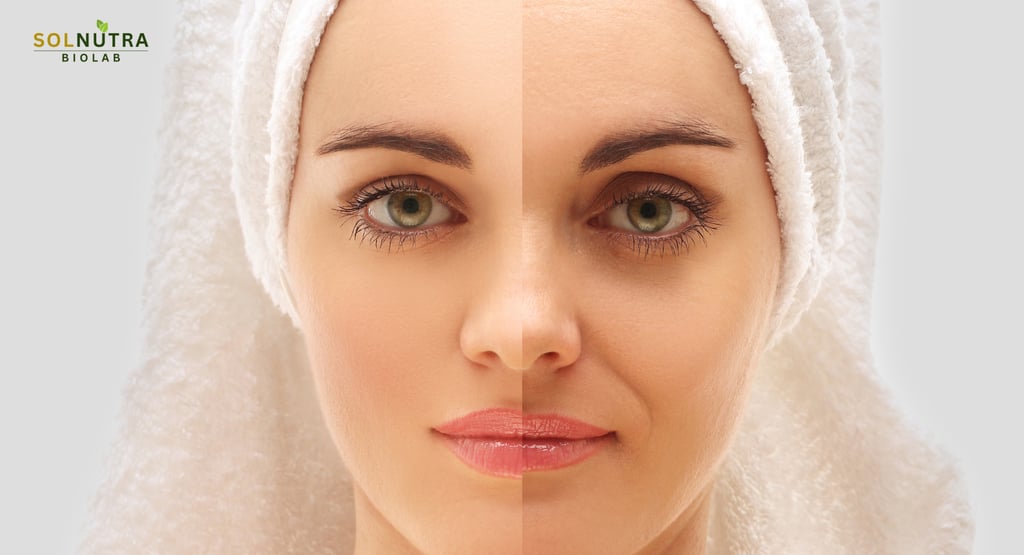Youthful Aging: Collagen Peptides vs. Hydrolysate
4 min read


Understanding Collagen: Types and Functions
Collagen is a vital protein that constitutes a significant portion of the human body's structure, playing crucial roles in maintaining the integrity and functionality of various tissues. It primarily exists in the skin, joints, bones, and connective tissues, providing strength, elasticity, and support. This protein is composed of amino acids, which are essential for various physiological functions. The body naturally produces collagen, which is abundant in younger individuals; however, as people age, collagen production declines, leading to noticeable changes, particularly in the skin's elasticity.
There are at least 28 different types of collagen, each with specific functions and properties. The most prevalent types are Type I, Type II, and Type III. Type I collagen is primarily found in the skin, tendons, and bones, offering tensile strength. Type II is predominantly located in cartilage, which cushions joints, while Type III supports the structure of blood vessels, dermis, and internal organs. Understanding these various collagen types is crucial, particularly when discussing collagen peptides and hydrolysate, which are popular forms of collagen supplementation associated with anti-aging benefits.
Collagen peptides are smaller chains of amino acids derived from the breakdown of collagen, making them easier for the body to absorb and utilize. On the other hand, collagen hydrolysate refers to collagen that has been hydrolyzed, a process that also breaks it down into smaller peptides. Both forms are believed to contribute positively to skin health by enhancing hydration, elasticity, and reducing visible signs of aging, such as wrinkles and fine lines. This supplementation is particularly vital as the body's natural collagen levels decrease with age, necessitating external sources to help maintain skin elasticity and overall youthfulness.
Molecular Weight Differences: Collagen Peptides vs. Hydrolysate
Collagen is a vital protein that serves as a foundational element in our bodies, contributing to the integrity and elasticity of skin, joints, and connective tissues. Understanding the differences in molecular weight between collagen peptides and hydrolysate is crucial, as these properties significantly influence their bioavailability and effectiveness as dietary supplements. Collagen peptides typically have a lower molecular weight compared to hydrolysate, which provides them with unique advantages when it comes to absorption.
The molecular weight of a protein can affect its solubility and, consequently, its bioavailability. Collagen hydrolysate, being the result of larger collagen molecules being broken down through a process known as hydrolysis, can possess a higher molecular weight. In contrast, collagen peptides are further processed to achieve smaller chains of amino acids, known as peptides, which enhances their ability to be absorbed through the intestinal barrier. This smaller size often results in a more rapid uptake into the bloodstream, allowing for quick distribution to tissues where collagen is needed.
Consequently, the molecular structure significantly influences not just absorption, but also the functional outcomes of these supplements. Research suggests that collagen peptides promote production of collagen in the dermis and improve skin hydration much more effectively compared to hydrolysate due to their lower molecular weight. Furthermore, the manufacturing processes play a key role in defining these characteristics. Enzymatic hydrolysis methods used to produce collagen peptides are designed to achieve specific molecular weights, which in turn can enhance their bioactivity and functionality in promoting youthful aging.
By understanding these molecular weight differences, consumers can make informed choices about which collagen supplement may be more effective for their unique needs and health goals, particularly regarding skin health and overall vitality.
Absorption Rates: How Your Body Utilizes Collagen
Collagen is a vital protein that contributes significantly to skin elasticity, joint function, and overall bodily health. When discussing the absorption of collagen, it is essential to differentiate between collagen peptides and hydrolysate. Both forms are derived from collagen and undergo processes to enhance bioavailability, thereby improving absorption rates in the body.
Collagen peptides are short chains of amino acids that result from the enzymatic breakdown of collagen. Their smaller molecular size allows for easier uptake into the bloodstream. Studies have shown that collagen peptides can stimulate collagen synthesis in the skin and other tissues, resulting in improved hydration and elasticity. Due to their bioavailability, collagen peptides typically exhibit faster absorption rates, making them a popular choice in dietary supplements aimed at anti-aging effects.
On the other hand, collagen hydrolysate refers to collagen that has been hydrolyzed into even smaller components, allowing for enhanced solubility and faster digestion. According to clinical research, hydrolysate can be absorbed in the gastrointestinal tract efficiently, with some studies indicating that it may promote serum collagen levels more effectively than standard collagen powders. This absorption capability makes collagen hydrolysate an attractive alternative for those looking to enhance their skin quality or joint health.
Several factors influence the absorption of these collagen forms, such as the individual's age, digestive health, and overall diet. For instance, an older adult may have a diminished capacity for protein digestion, which could affect collagen absorption. However, incorporating hydrolysate or peptides into a balanced diet may mitigate these issues. Additionally, combining collagen supplements with vitamin C can further promote collagen synthesis, highlighting the synergetic relationship between nutrients in supporting youthful aging.
In conclusion, while both collagen peptides and hydrolysate present benefits for absorption and subsequent biological effects, understanding how each form interacts with the body can assist consumers in making informed choices about their collagen supplementation.
Anti-Aging Outcomes: Benefits of Collagen Peptides and Hydrolysate
The quest for youthful aging has led to an increased interest in collagen supplementation, particularly in the form of collagen peptides and hydrolysate. Both forms have garnered attention due to their promising anti-aging benefits, primarily concerning skin hydration, elasticity, and wrinkle reduction. Numerous studies have highlighted that collagen peptides can significantly enhance skin hydration, leading to a plump and moist appearance. The small size of these peptides allows for better absorption into the skin, facilitating a boost in collagen production from within.
Hydrolyzed collagen, on the other hand, undergoes a process that breaks it down into smaller molecules, potentially increasing its bioavailability. This makes hydrolysate an ideal option for those looking to improve skin elasticity, as it has been shown to improve dermal collagen synthesis, directly impacting skin firmness. In a recent clinical trial, participants who consumed collagen hydrolysate experienced a noticeable reduction in skin wrinkles and improved dermal structure when compared to those who received a placebo.
Solnutra's premium Canadian hydrolyzed collagen peptides stand out in the market due to their superior quality and bioactive properties. These peptides not only refine skin texture but also actively rejuvenate the dermis, making them effective in targeting signs of aging. Unlike standard collagen products, Solnutra's formulation is designed to maximize absorption and efficacy, ensuring that users receive the full spectrum of benefits. The unique qualities of these products provide an edge in the competitive landscape of anti-aging supplements.
For those seeking to rejuvenate their skin and embrace a holistic approach to youthful aging, incorporating high-quality collagen peptides or hydrolysate is a beneficial strategy. Solnutra invites readers to explore their comprehensive anti-aging collection, which perfectly complements skincare routines and offers an effective solution for maintaining youthful skin.
